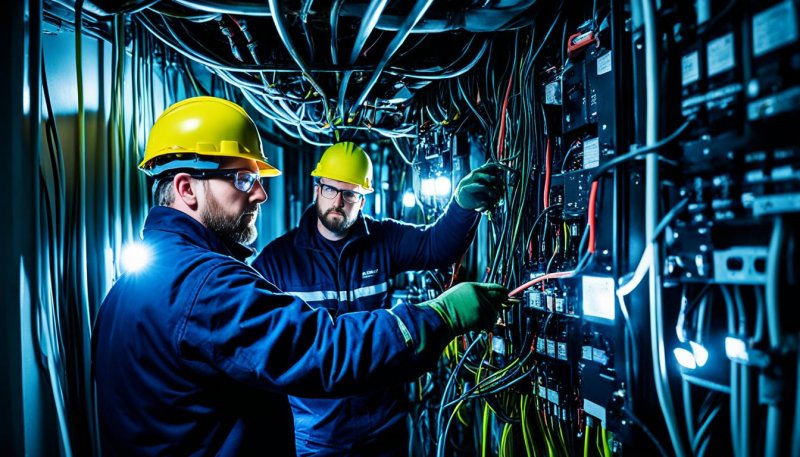As a field service organization, ensuring that our technicians are well-trained and prepared to tackle any challenge is crucial to our success. I vividly remember an incident that highlighted the importance of field technician training in overcoming common obstacles.
One day, I received a call from a frustrated customer named Sarah. She explained that she had been experiencing frequent power outages in her home, and despite multiple visits from different technicians, the issue remained unresolved. With each visit, Sarah’s frustration grew, and she was beginning to lose faith in our company’s ability to solve the problem.
I immediately recognized that this situation required a highly skilled technician. After carefully reviewing our team’s training records, I identified John, one of our seasoned technicians, who had recently completed an advanced troubleshooting course. I assured Sarah that John would be able to diagnose and fix the problem once and for all.

When John arrived at Sarah’s house, he began his investigation with a methodical approach. He carefully examined the electrical panel and tested various components to determine the root cause of the power outages. Finally, he discovered a faulty wire connection that had gone unnoticed by previous technicians.
Using his well-honed technical skills, John quickly repaired the connection, restoring power to Sarah’s home. Sarah was delighted, not only because her issue was finally resolved but also because John took the time to explain the problem and provide her with preventive measures to avoid future outages.
This incident reinforced the significance of field technician training. Well-trained technicians equipped with technical expertise, excellent customer service skills, and the ability to think critically can overcome common challenges and provide exceptional service.
Key Takeaways:
- Field technician training is essential for addressing common challenges in the field.
- Well-trained technicians can diagnose and solve issues efficiently, leading to improved customer satisfaction.
- Technical skills, customer service skills, and critical thinking are key components of effective field technician training.
- Investing in continuous learning and keeping up with future trends in field technician training is crucial for staying competitive in the industry.
- Field technician training programs should leverage technology to enhance learning experiences and provide access to valuable resources.
Key Components of Field Service Training
Field service training plays a crucial role in equipping technicians with the necessary skills to excel in their roles. To effectively prepare technicians for the challenges they may encounter, field service training should focus on three key areas: technical skills, customer interaction, and safety protocols.
Technical Skills
The technical skills component of field service training is essential for technicians to perform their job duties proficiently. Technicians need to be equipped with a diverse set of technical skills, including equipment installation, troubleshooting, and repair. This ensures that they can effectively address different issues that may arise during service calls and provide efficient solutions to customers.
Customer Interaction
In addition to technical skills, it is equally important for technicians to possess strong customer interaction skills. Building positive customer relationships and effectively communicating with customers are crucial aspects of the field service technician’s role. Training should focus on teaching technicians how to understand and meet customer needs, manage expectations, and handle conflicts or challenging situations with professionalism and empathy.

Safety Protocols
Safety should always be a top priority in field service training. Technicians work with potentially hazardous equipment and in various environments, making it essential to have comprehensive safety training in place. This training should cover protocols for handling equipment safely, identifying and mitigating risks, and following industry-specific safety guidelines. By prioritizing safety protocols, organizations can protect the well-being of technicians and create a safer working environment for everyone involved.
By addressing these key components of field service training, organizations can ensure that their technicians are equipped with the technical skills, customer interaction abilities, and safety protocols necessary to excel in their roles. The next section will explore the benefits of having well-trained technicians and how it translates into improved service quality and customer satisfaction.
The Benefits of Well-Trained Technicians
Well-trained technicians play a crucial role in delivering exceptional service and ensuring customer satisfaction. Their expertise and knowledge lead to a higher quality of service, resulting in increased customer satisfaction levels.
When customers encounter an issue, well-trained technicians have the skills to quickly diagnose and fix problems. Their efficiency reduces downtime and costs for the company, allowing for smooth operations and improved productivity.
Moreover, the confidence that comes with being well-trained enables technicians to have better interactions with customers. They can effectively address concerns, provide clear explanations, and offer personalized solutions. This level of customer care fosters long-term loyalty, as customers appreciate the high-quality service they receive.
At Field Service Company, we prioritize the training and development of our technicians. Our comprehensive training programs ensure that our technicians are equipped with the necessary skills and knowledge to provide top-notch service. We believe that investing in the training of our technicians not only benefits our customers but also contributes to the overall success of our company.
Implementing Field Service Training
When it comes to implementing field service training, organizations have different options to choose from. Two popular methods are training conferences and workshops, as well as on-the-job training.
Training conferences and workshops provide valuable opportunities for field technicians to engage in hands-on learning experiences and gain exposure to innovative techniques. These events bring together industry experts and professionals who share their knowledge and expertise, allowing technicians to learn from the best in the field.
On the other hand, on-the-job training is a practical and effective approach that integrates structured training schedules, knowledge tests, practical skill assessments, and customer satisfaction surveys. This method allows technicians to learn while actively performing their job responsibilities, ensuring that they acquire the necessary skills and knowledge in a real-world setting.
Both training conferences and workshops, as well as on-the-job training, play a vital role in enhancing the capabilities of field technicians. By leveraging these training methods, organizations can empower their technicians with the skills and knowledge needed to excel in their roles.
The Benefits of Conferences and Workshops
Training conferences and workshops offer a range of benefits for field technicians. They provide a platform for networking, allowing technicians to connect with peers, industry professionals, and potential mentors. These interactions facilitate the exchange of knowledge and best practices, nurturing personal and professional growth.
Conferences and workshops also offer hands-on training opportunities, enabling technicians to gain practical experience in a controlled environment. They can participate in simulations, practice new techniques, and receive immediate feedback, which helps them improve their skills and boost their confidence.
Additionally, these events expose technicians to the latest advancements and trends in the field service industry. They can learn about new technologies, tools, and methodologies that can enhance their performance and efficiency. Being up-to-date with industry developments equips technicians with the knowledge needed to deliver high-quality service.
Future Trends in Field Service Training
The field service technician training landscape is constantly evolving, driven by advancements in technology and a need to meet the ever-changing demands of the industry. To stay ahead, organizations must embrace data-driven training analytics, augmented reality, and mobility solutions.
Leveraging Data-Driven Training Analytics
Data-driven training analytics play a crucial role in creating personalized and targeted training programs. By analyzing performance data, organizations can identify knowledge gaps and tailor training content to address specific needs. This approach enhances the effectiveness of training and ensures technicians receive the right information at the right time.
Enhancing Training with Augmented Reality
Augmented reality (AR) technology brings a new level of interactivity to field service training. By overlaying digital information onto real-world environments, technicians can simulate complex scenarios and enhance problem-solving skills. AR also enables remote collaboration, allowing experts to guide technicians in real-time, increasing efficiency and reducing downtime.
Enabling Mobility Solutions for Training Access
Mobility solutions are transforming the way technicians access training resources. With mobile devices and applications, technicians can conveniently access training materials anytime, anywhere. This flexibility enables continuous learning and provides technicians with on-demand knowledge and support while on the field.
By incorporating data-driven training analytics, augmented reality, and mobility solutions, organizations can empower their technicians to stay ahead in the rapidly evolving field service industry. These trends not only improve training effectiveness but also contribute to increased productivity, efficiency, and customer satisfaction.

Understanding the Importance of Field Service Training
Field service training is a critical component for delivering exceptional service and ensuring high levels of customer satisfaction. When technicians receive comprehensive training, they gain a deep understanding of their work, enabling them to accurately diagnose issues and provide efficient solutions. This level of expertise directly impacts the quality of service delivered, which in turn has a significant influence on overall customer satisfaction.
Well-trained technicians possess the knowledge and skills necessary to handle various challenges that may arise in the field. They are equipped to troubleshoot problems effectively, minimizing downtime and ensuring prompt resolution. By providing comprehensive training, organizations can ensure that their technicians are well-prepared to meet or exceed customer expectations.
Service quality plays a vital role in customer satisfaction. When technicians are well-trained, they consistently deliver high-quality service, leaving customers satisfied with their experience. From prompt and accurate repairs to clear communication and professionalism, well-trained technicians have the skills to provide exceptional service that leaves a lasting positive impression on customers.
Comprehensive field service training ensures that technicians are up to date with the latest industry standards and best practices. It equips them with the necessary tools and knowledge to adapt to evolving technologies and requirements. This ongoing learning and development enable technicians to stay ahead in the ever-changing field service industry.
It is evident that field service training is not only beneficial for technicians but also for the overall success of a company. Investing in training programs is an investment in customer satisfaction, as well as the reputation and growth of the business.
Key Components of Field Service Training
When it comes to field service training, there are three key components that every technician should excel in: technical skills, customer service skills, and safety training.
First and foremost, technical skills are essential for field technicians. They need to be proficient in repairing and maintaining equipment, diagnosing issues accurately, and implementing effective solutions. This includes understanding complex systems and being able to troubleshoot and resolve problems efficiently.
In addition to technical skills, customer service skills are crucial. Field technicians often interact directly with customers, and providing exceptional service is crucial for customer satisfaction. This involves effective communication, active listening, and problem-solving skills to navigate any conflicts and ensure a positive customer experience.
Safety training is another vital component of field service training. Technicians must be aware of safety protocols and practices to protect themselves, their colleagues, and the customers they serve. This includes understanding proper equipment usage, following safety guidelines, and being prepared for emergency situations.
The integration of these key components – technical skills, customer service skills, and safety training – ensures that field technicians are well-rounded professionals who can deliver excellent service while prioritizing safety. By equipping technicians with these skills, organizations can provide a high level of service and build strong relationships with their customers.
Building a Field Service Training Program
Developing a comprehensive field service training program is essential for equipping technicians with the necessary skills and knowledge to excel in their roles. A well-designed training curriculum that encompasses technical skills, customer service skills, and safety training lays the foundation for a competent and efficient workforce.
A key aspect of building a successful training program is creating a structured training curriculum that covers a wide range of topics relevant to field service technicians. The curriculum should be carefully crafted to address the specific needs and challenges of the industry, ensuring that technicians are equipped with the skills required to tackle the diverse tasks they will encounter in their roles.
Modular training is an effective approach to deliver the training content in a manageable and sequential manner. By dividing the curriculum into smaller, focused modules, technicians can learn and master one area before moving on to the next. This modular training approach allows for flexible learning and ensures that technicians can absorb the information effectively.
The choice of training methods is crucial in engaging and accommodating different learning styles. A combination of instructor-led training, where experienced professionals guide technicians through practical demonstrations and hands-on exercises, and e-learning platforms, which provide self-paced learning opportunities, can create a well-rounded training experience.
Regular assessments throughout the training program allow organizations to evaluate the technicians’ understanding and progress. These assessments can take various forms, including quizzes, exams, and hands-on simulations. By monitoring the technicians’ performance, trainers can identify areas of improvement and tailor the training program accordingly.
Feedback mechanisms play a vital role in continuously improving the training program. Establishing open channels of communication allows technicians to provide their insights and suggestions, contributing to the program’s overall effectiveness. Regular feedback sessions, such as surveys or one-on-one discussions, help identify strengths and areas for improvement and ensure that the training program evolves to meet the evolving needs of technicians and the organization.
Implementing a well-structured field service training program not only equips technicians with the necessary skills to perform their duties but also fosters a culture of continuous learning and development within the organization. By investing in training, companies can empower their technicians, enhance service quality, and drive customer satisfaction.
Leveraging Technology in Field Service Training
When it comes to field service training, technology plays a vital role in enhancing the learning experience and improving technician skills. Incorporating technology in training enables organizations to provide flexible and efficient training solutions. Let’s explore some of the key technologies that are revolutionizing field service training.
E-Learning Platforms
E-learning platforms offer a versatile and self-paced learning environment for technicians. These platforms allow individuals to access training materials and modules at their convenience, making it easier to fit training into their busy schedules. With e-learning platforms, technicians can learn at their own pace, review content as needed, and track their progress through interactive assessments and quizzes.
Virtual Reality
Virtual reality (VR) technology is transforming the way technicians are trained. By creating immersive and lifelike environments, VR allows technicians to practice their skills in simulated real-world scenarios. Through hands-on practice with virtual equipment and interactive simulations, technicians gain valuable experience and confidence before encountering similar situations in the field. Virtual reality offers a safe and controlled environment for learning, allowing technicians to make mistakes and learn from them without any real-world consequences.
Mobility Solutions
Field service technicians are constantly on the move, and mobility solutions enable them to access training materials and resources while in the field. With the use of mobile devices, technicians can easily access training modules, instructional videos, and troubleshooting guides at any time and from any location. Mobility solutions provide technicians with the flexibility to engage in continuous learning and stay updated with the latest training materials and industry best practices, ultimately enhancing their skills and knowledge.
By leveraging these technologies, organizations can maximize the effectiveness of their field service training programs. E-learning platforms, virtual reality simulations, and mobility solutions empower technicians to learn and develop their skills in innovative and engaging ways. As technology continues to advance, the possibilities for enhancing field service training are endless.
Overcoming Challenges in Field Service Training
Field service training encounters various challenges, including the skills gap and generational gap. It is important for companies to provide targeted training that caters to the specific needs of different generations and addresses the skill shortage. By leveraging technology-driven training and creating interactive learning environments, these challenges can be overcome, resulting in effective training for all technicians.
Addressing the Skills Gap
The skills gap refers to the disparity between the skills required for a job and the skills possessed by the workforce. In the field service industry, the rapid advancement of technology has created a significant skills gap, making it crucial for companies to bridge this divide through comprehensive training programs. By offering specialized technical training and upskilling opportunities, organizations can equip technicians with the necessary skills to excel in their roles.
Solving the Generational Gap
The generational gap refers to the differences in values, behaviors, and preferences between different generations in the workforce. With the presence of Baby Boomers, Generation X, Millennials, and Generation Z in today’s field service industry, training programs must cater to the unique needs and learning styles of each generation. This can be achieved by utilizing diverse training methods such as mentorship programs, collaborative learning environments, and interactive digital platforms.
Embracing Technology-Driven Training
Technology-driven training plays a vital role in overcoming challenges in the field service industry. By incorporating e-learning platforms, virtual reality simulations, and mobile training solutions, organizations can provide technicians with innovative and accessible learning experiences. These technologies enable technicians to enhance their technical skills, stay up-to-date with industry advancements, and adapt to new service methodologies.
In conclusion, field service training faces challenges such as the skills gap and generational gap. By addressing these challenges through targeted training programs that leverage technology-driven approaches, companies can ensure that their technicians are well-equipped to excel in their roles and meet the evolving demands of the industry.
Conclusion
Bridging the field technician skills gap requires a comprehensive training plan that addresses the needs of different generations and skill levels. To ensure a well-trained and efficient workforce, organizations must invest in field service training.
Hands-on learning plays a crucial role in developing the technical skills and expertise of field technicians. By providing opportunities for practical experience and real-life scenarios, organizations can bridge the gap between theory and application.
In addition, data-driven insights enable organizations to identify training gaps and tailor their programs accordingly. By leveraging technology in training, such as e-learning platforms and virtual reality simulations, organizations can provide a personalized learning experience that engages technicians and enhances their skills.
By adopting a technology-driven training approach and developing a comprehensive training plan, organizations can bridge the field technician skills gap and equip their workforce with the necessary skills to excel in the field service industry.
See how FieldAx can transform your Field Operations.
Try it today! Book Demo
You are one click away from your customized FieldAx Demo!
FAQ
What are the key components of field service training?
The key components of field service training include technical skills, customer interaction, and safety protocols.
Why is it important to have well-trained technicians?
Well-trained technicians provide better quality of service, leading to increased customer satisfaction and reduced downtime and costs for the company.
How can field service training be implemented?
Field service training can be implemented through training conferences and workshops, as well as on-the-job training.
What are the future trends in field service technician training?
The future trends in field service technician training include data-driven training analytics, augmented reality, and mobility solutions.
Why is field service training important?
Field service training is crucial for delivering exceptional service and achieving high levels of customer satisfaction.
What are the key components of field service training?
The key components of field service training include technical skills, customer service skills, and safety training.
How can a field service training program be built?
A field service training program can be built by creating a training curriculum that covers technical skills, customer service skills, and safety training.
How can technology enhance field service training?
Technology can enhance field service training through e-learning platforms, virtual reality, and mobility solutions.
What are the challenges in field service training?
The challenges in field service training include a skills gap and a generational gap.
How can organizations overcome these challenges in field service training?
Organizations can overcome these challenges by implementing technology-driven training and interactive learning environments.
How can organizations bridge the field technician skills gap?
Organizations can bridge the field technician skills gap by implementing a comprehensive training plan that addresses the needs of different generations and skill levels.
Author Bio
Co-Founder & CMO at Merfantz Technologies Pvt Ltd | Marketing Manager for FieldAx Field Service Software | Salesforce All-Star Ranger and Community Contributor | Salesforce Content Creation for Knowledge Sharing





